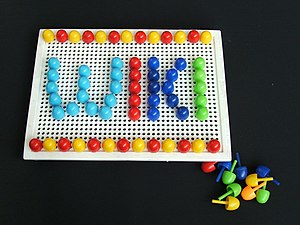Yesterday I spent a good amount of time learning the structure of yet another wiki product. Wikis are another point on the timeline in regard to my thinking about containers for qualitative research. I have to thank Silvana diGregorio, again, for this one. As we began work on a chapter about new developments in technologies in qualitative research for the Fourth Edition of the Handbook on Qualitative Research (Denzin & Lincoln: Look for this at the end of 2010)...she suggested that we use a wiki and got us set up in PB Works. My life hasn't been the same since.
It was as if we were sharing the same office--a magical room that both of us could step into from our very different geographical locations--she in London, and myself in Massachusetts. It took me a while to learn to navigate, but as I did so I was acutely aware of how I was building on the skills I had honed learning qualitative data analysis software (QDAS)--thinking about organization, standards, efficiencies for a transparant electronic shell. We started with a single item --Norman Denzin's instructions about the chapter--and from that it grew and grew. We created memos, added resources--articles and powerpoint presentations, and then we began to write the article...and rewrite...and rewrite. When feedback arrived from the reviewers that went in too. It was our file cabinet, our work table, and our editorial meeting room. Ironically, we found ourselves writing from the bowels of Web 2.0 as we were trying to understand the role Web 2.0 would play with qualitative researchers and their analysis tools.
This wiki experience felt a lot like QDAS to me, and we began to look for ways that other qualitative researchers might be thinking about this. Luckily, we'd both been active in planning the Day in Technology in Qualitative Research for the Fourth Congress on Qualitative Inquiry where we had the opportunity to hear a couple of sessions that pointed in this direction.
Kakali Battacharya is an innovator in this area--check out what she has been doing.
Melanie Hundley of Vanderbilt University has also experimented with these tools.
As a teacher, I am particularly interested in the implications of these tools for students who are rising qualitative researchers. Last semester I begin to use wiki's with the three face-to-face classes I taught. This semester I will use wiki's with three online classes I am teaching, which will require me to find a way to work across Blackboard and wikis.
Thinking about Wiki's as qualitative research technologies AND thinking about how to use wiki's for teaching qualitative research has made me more aware of how the discipline of qualitative research serves as a pedagogical model for me. The way I teach has much to do with the ways I have been socialized as a researcher: we explore issues through observations, interviews, and other qualitative like data; we focus on the interpretation non-numerical texts; and extremely important, we DOCUMENT!! We document our observations, impressions, feelings, and we integrate our ideas through continued documentation. Wiki's are phenomenal tools for documentation in a qualitative research way.
Wiki's and QDAS...there's a lot to think about.

![Reblog this post [with Zemanta]](http://img.zemanta.com/reblog_e.png?x-id=7be75cb2-a589-4c53-9517-12972a20b35b)
No comments:
Post a Comment